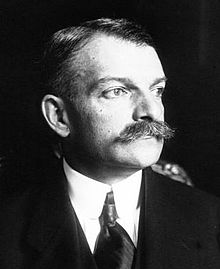Raoul Péret
Raoul Adolphe Péret (born November 29, 1870 in Châtellerault , † July 22, 1942 in Saint-Mandé ) was a French lawyer and politician of the Third Republic . He was President of the Chamber of Deputies from 1920 to 1924 and from 1926 to 1927, and between 1914 and 1930 he held several ministerial posts .
Life
Péret was born the son of a lawyer who initially worked as a public prosecutor at the Court of Appeal and later as a member of the Magistrate at the Court of Cassation in Poitiers . After attending school, he studied philology and law at the University of Poitiers . After completing his studies, he worked as a lawyer and in 1893 he was a consultant for the Minister of Justice Eugène Guérin . Two years later he became a doctor of law doctorate . From 1896 to 1902 he worked as deputy public prosecutor in Auxerre .
His legal career eventually led Péret to politics. From 1901 to 1942 he was mayor of Vendeuvre-du-Poitou ( Département Vienne ) and from 1901 to 1935 he was also a member of the General Council of the Canton of Neuville-de-Poitou , which he chaired from 1920 to 1925. In May 1902 he was elected to the Chamber of Deputies , to which he belonged without interruption and almost exclusively as a member of the radical left until 1927. In the Chamber of Deputies (Chambre des députés) he held the office of Vice President from 1919 to 1920 and from February 12, 1920 to May 31, 1924 and again from July 22, 1926 to January 11, 1927 the office of President. In 1921 he gave a speech in parliament in which he criticized France's disadvantages resulting from the Treaty of Versailles . Furthermore, after the resignation of Georges Leygues , he mediated between rivals Aristide Briand and Raymond Poincaré in order to move both to a common government. His attempt at compromise failed, however.
Pérets first entered government on December 9, 1913, when he was appointed Undersecretary of State in the Interior Ministry in the cabinet led by Gaston Doumergue . From March 17, 1914 until the government resigned in early June 1914, he served as Minister of Commerce, Industry, Post and Telegraphy. After the outbreak of the First World War , he served briefly as an officer for the prefecture in Vienne, but then turned back to political life and practiced the function of Minister of Justice from September 12 to November 16, 1917, during the two-month term of Paul Painlevé out.
On March 26, 1926, Péret was appointed finance minister in the ninth Briand cabinet. He tried to counter the ongoing financial crisis with tax increases, but he was unable to stop the steadily rising inflation rate and reduce the budget deficit, whereupon he left the government on June 23, 1926 and was replaced as Finance Minister by Joseph Caillaux . From 1927 he was senator for the Vienne department.
On March 2, 1930, Péret was again Minister of Justice, now in the government led by André Tardieu . Although Tardieu stood up for him, his tenure ended on November 16, 1930, when he resigned because of the "Oustric Affair". During his tenure as finance minister in 1926, he had advised the banker Albert Oustric , whose speculations subsequently led to a banking crisis. With his resignation, which took place in particular because of the attacks by the socialists and radical socialists, he took on political responsibility. The case was dealt with by a committee of inquiry, which on December 30, 1930 acquitted him of his guilt. This was followed by an acquittal by the Supreme Court on July 24, 1931. Nevertheless, this was a turning point for his political career, as he had previously been traded as a possible candidate for the office of president. His political career finally ended in 1936 when he left the Senate.
Furthermore, from 1922 to 1932, Péret was President of the French child protection association Union française pour le sauvetage de l'enfance (UFSE).
Web links
- Raoul Péret at the Assemblée nationale
- Raoul Péret at the Sénat
- Raoul Péret at the Center des archives économiques et financières
| predecessor | Office | successor |
|---|---|---|
|
René Viviani Théodore Steeg |
Minister of Justice of France September 12, 1917 - November 16, 1917 March 2, 1930 - November 16, 1930 |
Louis Nail Henry Chéron |
| Paul Doumer |
Finance Minister of France March 26, 1926 - June 23, 1926 |
Joseph Caillaux |
|
Paul Deschanel Edouard Herriot |
President of the French Chamber of Deputies February 12, 1920 - May 31, 1924 July 22, 1926 - January 11, 1927 |
Paul Painlevé Fernand Bouisson |
| personal data | |
|---|---|
| SURNAME | Péret, Raoul |
| ALTERNATIVE NAMES | Péret, Raoul Adolphe (full name) |
| BRIEF DESCRIPTION | French lawyer and politician |
| DATE OF BIRTH | November 29, 1870 |
| PLACE OF BIRTH | Châtellerault |
| DATE OF DEATH | July 22, 1942 |
| Place of death | Saint-Mandé |
